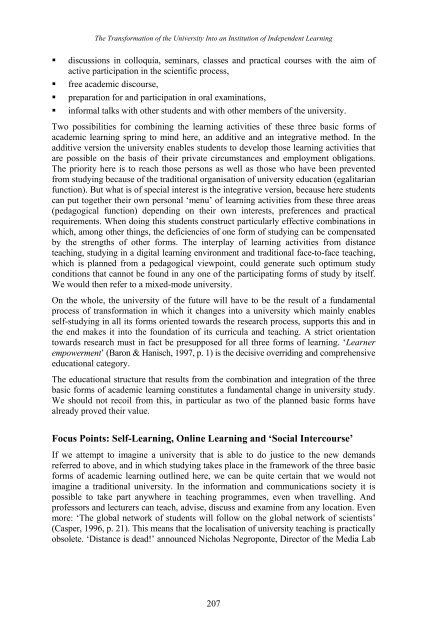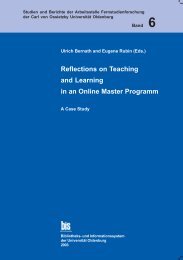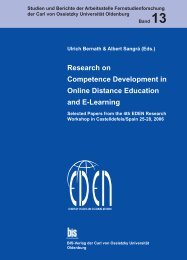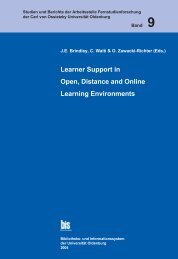Distance Education in Transition - Master of Distance Education ...
Distance Education in Transition - Master of Distance Education ...
Distance Education in Transition - Master of Distance Education ...
You also want an ePaper? Increase the reach of your titles
YUMPU automatically turns print PDFs into web optimized ePapers that Google loves.
The Transformation <strong>of</strong> the University Into an Institution <strong>of</strong> Independent Learn<strong>in</strong>g<br />
� discussions <strong>in</strong> colloquia, sem<strong>in</strong>ars, classes and practical courses with the aim <strong>of</strong><br />
active participation <strong>in</strong> the scientific process,<br />
� free academic discourse,<br />
� preparation for and participation <strong>in</strong> oral exam<strong>in</strong>ations,<br />
� <strong>in</strong>formal talks with other students and with other members <strong>of</strong> the university.<br />
Two possibilities for comb<strong>in</strong><strong>in</strong>g the learn<strong>in</strong>g activities <strong>of</strong> these three basic forms <strong>of</strong><br />
academic learn<strong>in</strong>g spr<strong>in</strong>g to m<strong>in</strong>d here, an additive and an <strong>in</strong>tegrative method. In the<br />
additive version the university enables students to develop those learn<strong>in</strong>g activities that<br />
are possible on the basis <strong>of</strong> their private circumstances and employment obligations.<br />
The priority here is to reach those persons as well as those who have been prevented<br />
from study<strong>in</strong>g because <strong>of</strong> the traditional organisation <strong>of</strong> university education (egalitarian<br />
function). But what is <strong>of</strong> special <strong>in</strong>terest is the <strong>in</strong>tegrative version, because here students<br />
can put together their own personal ‘menu’ <strong>of</strong> learn<strong>in</strong>g activities from these three areas<br />
(pedagogical function) depend<strong>in</strong>g on their own <strong>in</strong>terests, preferences and practical<br />
requirements. When do<strong>in</strong>g this students construct particularly effective comb<strong>in</strong>ations <strong>in</strong><br />
which, among other th<strong>in</strong>gs, the deficiencies <strong>of</strong> one form <strong>of</strong> study<strong>in</strong>g can be compensated<br />
by the strengths <strong>of</strong> other forms. The <strong>in</strong>terplay <strong>of</strong> learn<strong>in</strong>g activities from distance<br />
teach<strong>in</strong>g, study<strong>in</strong>g <strong>in</strong> a digital learn<strong>in</strong>g environment and traditional face-to-face teach<strong>in</strong>g,<br />
which is planned from a pedagogical viewpo<strong>in</strong>t, could generate such optimum study<br />
conditions that cannot be found <strong>in</strong> any one <strong>of</strong> the participat<strong>in</strong>g forms <strong>of</strong> study by itself.<br />
We would then refer to a mixed-mode university.<br />
On the whole, the university <strong>of</strong> the future will have to be the result <strong>of</strong> a fundamental<br />
process <strong>of</strong> transformation <strong>in</strong> which it changes <strong>in</strong>to a university which ma<strong>in</strong>ly enables<br />
self-study<strong>in</strong>g <strong>in</strong> all its forms oriented towards the research process, supports this and <strong>in</strong><br />
the end makes it <strong>in</strong>to the foundation <strong>of</strong> its curricula and teach<strong>in</strong>g. A strict orientation<br />
towards research must <strong>in</strong> fact be presupposed for all three forms <strong>of</strong> learn<strong>in</strong>g. ‘Learner<br />
empowerment’ (Baron & Hanisch, 1997, p. 1) is the decisive overrid<strong>in</strong>g and comprehensive<br />
educational category.<br />
The educational structure that results from the comb<strong>in</strong>ation and <strong>in</strong>tegration <strong>of</strong> the three<br />
basic forms <strong>of</strong> academic learn<strong>in</strong>g constitutes a fundamental change <strong>in</strong> university study.<br />
We should not recoil from this, <strong>in</strong> particular as two <strong>of</strong> the planned basic forms have<br />
already proved their value.<br />
Focus Po<strong>in</strong>ts: Self-Learn<strong>in</strong>g, Onl<strong>in</strong>e Learn<strong>in</strong>g and ‘Social Intercourse’<br />
If we attempt to imag<strong>in</strong>e a university that is able to do justice to the new demands<br />
referred to above, and <strong>in</strong> which study<strong>in</strong>g takes place <strong>in</strong> the framework <strong>of</strong> the three basic<br />
forms <strong>of</strong> academic learn<strong>in</strong>g outl<strong>in</strong>ed here, we can be quite certa<strong>in</strong> that we would not<br />
imag<strong>in</strong>e a traditional university. In the <strong>in</strong>formation and communications society it is<br />
possible to take part anywhere <strong>in</strong> teach<strong>in</strong>g programmes, even when travell<strong>in</strong>g. And<br />
pr<strong>of</strong>essors and lecturers can teach, advise, discuss and exam<strong>in</strong>e from any location. Even<br />
more: ‘The global network <strong>of</strong> students will follow on the global network <strong>of</strong> scientists’<br />
(Casper, 1996, p. 21). This means that the localisation <strong>of</strong> university teach<strong>in</strong>g is practically<br />
obsolete. ‘<strong>Distance</strong> is dead!’ announced Nicholas Negroponte, Director <strong>of</strong> the Media Lab<br />
207





